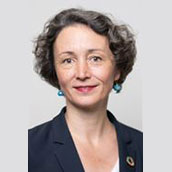Speakers
Day 1: Monday, September 30, 2024

Prof. Dr. Anna-Katharina Hornidge holds the positions of Director of the German Institute of Development and Sustainability (IDOS), Professor for Global Sustainable Development at the University of Bonn, and has been a Member of the German Advisory Council on Global Change since March 2020. She specializes in Development and Knowledge Sociology.
Her research encompasses a wide range of areas including natural resources governance and sense-making, the social construction of knowledge, social, political, and ecological environments, as well as risks and ‘realities’. She also focuses on cultures of knowledge production and sharing, innovation development processes, science policy, mobility, borders, and boundaries, as well as transformative science, inter- and transdisciplinarity.
After completing her habilitation in Development Politics at the University of Bonn in 2014, she led the Department of Political and Cultural Change at ZEF, where she had been a Researcher and Research Coordinator since 2006. From 2015 to 2020, she held a position at the Leibniz Centre for Tropical Marine Research (ZMT), University of Bremen, serving as the Head of the Centre from 2016 onwards.

Prof. Dr. Ernest Aryeetey currently serves as the Secretary-General of the African Research Universities Alliance (ARUA) and is a former Vice-Chancellor of the University of Ghana. During his tenure as Vice-Chancellor, he strategically focused on transforming the university into a research-intensive institution dedicated to fostering structural transformation in Ghana and across Africa.
Before assuming the role of Vice-Chancellor, Prof. Aryeetey held positions as a Senior Fellow and Director of the Africa Growth Initiative at the Brookings Institution in Washington, D.C. He also served as the Director of the Institute of Statistical, Social and Economic Research (ISSER) at the University of Ghana, Legon, from February 2003 to January 2010.
Prof. Aryeetey’s research interests lie in the economics of development, with a particular focus on institutions and their role in development, regional integration, economic reforms, financial systems supporting development, and small enterprise development. Prof. Aryeetey earned his undergraduate degree in Economics from the University of Ghana and pursued graduate studies at the Universitaet Dortmund in Germany, where he completed his PhD in 1985. In recognition of his significant contributions to the study of African economies and higher education transformation in Africa, he was awarded an honorary degree by the University of Sussex, UK, in July 2017.

Prof. Dr. Shenggen Fan holds the position of Chair Professor at the College of Economics and Management and Dean of Academy of Global Food Economics and Policy at China Agricultural University in Beijing.
Prof. Fan holds memberships in various esteemed organizations, including the Global Panel on Agriculture and Food Systems for Nutrition, the Council of Advisers of the World Food Prize, Board of University of Central Asia, and Eat-Lancet Commission on Food, Planet and Health.
Prior to his current role, Prof. Fan dedicated over 20 years to the International Food Policy Research Institute (IFPRI), where he served as Director General for a decade until December 2019. Within IFPRI, he held various positions including Division Director of Development Strategy and Governance and Senior Research Fellow.
Prof. Fan earned his PhD in Applied Economics and an MSc in Agricultural Economics. He was appointed to the CGIAR System Board in September 2020, furthering his contributions to global agricultural research and policy.

Sanjana Rajasekar is a junior researcher and doctoral candidate at the One Health and Urban Transformation Graduate School at the Centre for Development Research at the University of Bonn. Together with other doctoral students and senior researchers she founded the ZEF Working Group “Decolonizing Knowledge”. She holds a Bachelor of Economics from Azim Premji University and Master of Science in Development Economics from the University of Göttingen. She has worked on projects pertaining to food security and social protection in various parts of India. Sanjana is a member of Women in Global Health, India, and the Decolonizing and Diversifying Economics network.
Day 2: Tuesday, October 1, 2024

Prof. Dr. Jakob Zinsstag works at the Swiss Tropical and Public Health Institute (TPH) in Basel, Switzerland. He obtained his doctorate in veterinary medicine (Dr. med. vet.) specializing in salmonella diagnosis from the Veterinary Faculty of the University of Berne in 1986. Additionally, he holds a PhD in tropical animal production.
Dr. Zinsstag’s career trajectory includes diverse experiences ranging from rural veterinary practice to post-doctoral research on trypanosomiasis at the Swiss Tropical Institute. He led a livestock helminthosis project for the University of Berne in The Gambia from 1990 to 1993 and served as the head of the Centre Suisse de Recherches Scientifiques in Abidjan, Côte d’Ivoire, from 1994 to 1998.
Since 1998, Dr. Zinsstag has led a research group at the Swiss Tropical and Public Health Institute (Swiss TPH), focusing on the intersection of human and animal health, particularly among nomadic populations, and the control of zoonoses in developing countries under the “one health” paradigm. He has held the position of Professor of Epidemiology at the University of Basel since 2010 and has served as Deputy Head of the Department of Epidemiology and Public Health at Swiss TPH since 2011.

Dr. Isabel Madzorera is an Assistant Professor in Public Health Nutrition at the University of California, Berkeley, a position she has held since 2022. Her research focuses on global nutrition, with a particular emphasis on understanding the determinants of poor maternal and child nutrition outcomes in low- and middle-income country settings.
Dr. Madzorera conducts multi-faceted research aimed at addressing the global health problem of poor-quality diets among women, children, and adolescents, and their relationship to the triple burden of malnutrition in LMICs. Her work specifically delves into the intersection of diet, nutritional status, food systems, and maternal and child health.
She holds a Doctor of Science (ScD) in Nutrition Epidemiology from the Harvard T.H Chan School of Public Health. Prior to her current role, she worked at Harvard University from 2014 to 2022, contributing to research and scholarship in the field of public health nutrition.
Day 3: Wednesday, October 2, 2024

Dr. Jessica Thorn is a Lecturer in Sustainable Development at the School of Geography and Sustainable Development at the University of St Andrews, UK. Additionally, she serves as an ARISE (African Research Initiative for Scientific Excellence) Fellow at the Department of Environmental Sciences at the University of Namibia. Her research focuses on integrated problem domains climate change adaptation, nature-based solutions, green infrastructural geographies, informality and social-ecological system transitions in peri-urban, smallholder, and mountain systems. She currently has research ongoing in Madagascar, Namibia, Sierra Leone, Kenya and Tanzania.
Jessica’s research has had a tangible impact on policy, with affiliations to the UN, World Bank, governments, NGOs, and close collaboration with local stakeholders across sectors. She has contributed to regional debates, bringing novel approaches in regional public discourse and UN policy reports to non-specialist audiences. She served as the coordinating lead author for the UNFAO State of Urban Forestry Report in sub-Saharan Africa, a contributing author to the IPCC AR6 WGII Impacts, Adaptation, and Vulnerability Africa and Mountain chapters and coordinating Lead Author for the Global Environmental Outlook 6 Business Policy brief on climate proofing infrastructure. Additionally she contributed to The Economics of Ecosystems and Biodiversity and the Agri-Food Systems Report, which shaped the African Union’s and SADC Secretariat’s Climate Change Strategy.

Affiliate Professor Dr. rer. agr. Michelle Chevelev-Bonatti‘s research is centered on the co-design of innovations and social learning for sustainable land use. She earned her Ph.D. from the Humboldt University of Berlin, Faculty of Life Sciences, focusing on social learning and community-based strategies to promote Sustainable Development Goals (SDGs). With over a decade of experience, she has been involved in projects across Latin America, Asia, and Africa, earning recognition with four awards for her academic achievements. Dr. Chevelev-Bonatti has previously worked at the FAO and currently serves as the deputy head of the Susland group at the Leibniz-Centre for Agricultural Landscape Research (ZALF). Additionally, she is a lecturer on Environmental Sociology and Policy at Humboldt University.

Fernanda Barbosa dos Santos is a journalist at the independent media outlet Rutas del Conflicto, a lecturer at the Journalism and Public Opinion program at University of Rosario (Colombia). She is a PhD candidate of the Doctoral Studies Support Program (DSSP) in human and social sciences at the National University of Colombia (UNAL), in joint supervision with the University of Sao Paulo (Brazil). Her work is based on careful listening to stories and on respectful storytelling about conflicts, human rights and peacebuilding in Colombia.
In Brazil, her home country, she worked as a reporter in local and international newspaper sections and as correspondent of a news agency. ln Colombia, she was a consultant to the Truth Commission, in the coordination team of the project Traces of disappearance.
Her research interests focus on the connections among journalistic praxis and works of memory, especially through collaborative methodologies.

Amit Kumar is a Junior Researcher at the Right Livelihood College Bonn, within the ZEF Group for Cultural and Political Change (CPC). He holds a Bachelor of Arts in History from the University of Delhi and a Master’s in Social Work specializing in Livelihoods and Social Innovations from the Tata Institute of Social Sciences, Mumbai (India). His doctoral thesis is titled ‘Urban Citizenship: An Ethnographic Study of Everyday Practices, Resistance, and Negotiations in the Slum Communities of Mumbai’.

Dr. Jonathan Ngeh is a Post-doctoral Researcher and Principal Investigator at the Global South Studies Center (GSSC) in Cologne. He serves as the speaker of the Co-producing Knowledge thematic group at the GSSC. Jonathan earned his PhD in sociology from the University of Umeå, Sweden. He specializes in the study of transnational migration with a specific focus on the experiences of Africans in Northern Europe and the Gulf Cooperation Council (GCC) states.
He has conducted extensive fieldwork in Cameroon, Sweden, and the United Arab Emirates. His research is dedicated to exploring various aspects related to the reproduction of societal inequalities, which manifest across social, economic, and epistemic spheres. Before joining the GSSC in 2019, he taught Development Theory and Policy at the University of Bamenda, Cameroon.

